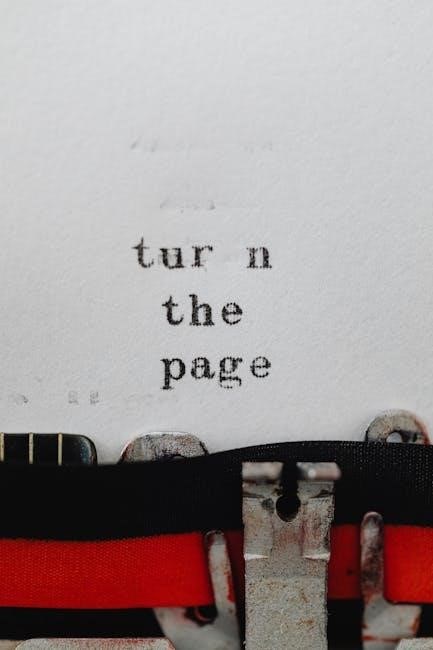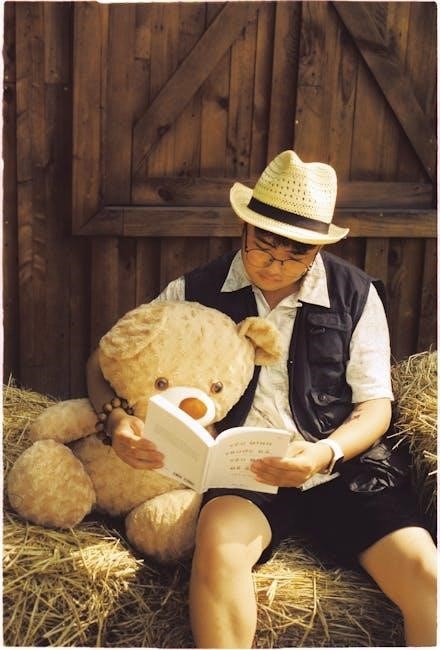the egg short story pdf
The Egg, a short story by Andy Weir, explores profound philosophical themes through a simple narrative, symbolizing the universe’s essence and humanity’s eternal journey within it․
Overview of the Story
The Egg, written by Andy Weir, is a thought-provoking short story that follows a man who dies in a car accident and encounters a divine being․ This entity reveals that the man’s soul will be reincarnated into every human life that has or will exist, allowing him to experience all perspectives and grow spiritually․ The narrative explores themes of existence, reincarnation, and the ultimate purpose of life, presenting a unique vision of human consciousness and its eternal journey․ The story’s simplicity belies its profound depth, making it a compelling read for philosophical reflection․
Significance of the Title “The Egg”
The title “The Egg” symbolizes the universe’s essence and humanity’s eternal journey․ It represents the birthplace of existence, where life emerges and evolves․ The egg embodies unity, simplicity, and infinite potential, reflecting the story’s central theme of reincarnation and soul growth․ This metaphor encapsulates the idea that all human experiences are interconnected, and the egg serves as a powerful symbol of cosmic unity and the cyclical nature of existence․ The title’s simplicity mirrors the story’s profound yet streamlined exploration of life’s meaning․
Background of the Author
Andy Weir, an American author, gained fame with The Martian․ His short story The Egg was self-published online, showcasing his ability to blend philosophy and storytelling․
Andy Weir and His Literary Career
Andy Weir, a renowned American author, initially gained recognition through his self-published works․ The Egg, released on his website in 2009, became a viral sensation, highlighting his unique storytelling and philosophical depth․ His subsequent novel, The Martian, catapulted him to fame, earning critical acclaim and commercial success․ Weir’s writing often blends science fiction with thought-provoking themes, captivating readers worldwide․ His literary career exemplifies how online platforms can launch authors into the spotlight, showcasing his ability to connect with audiences through compelling narratives․
Publication History of “The Egg”
The Egg was first published on Andy Weir’s personal website, Galactanet, in August 2009․ Initially shared as a free short story, it quickly gained popularity through word of mouth and online sharing․ The story’s viral spread led to translations into over 30 languages by fans worldwide․ Its success was entirely organic, with no formal marketing or advertising efforts․ This grassroots popularity highlighted the power of compelling storytelling in the digital age, cementing its place as one of Weir’s most beloved works․
Plot Summary
The story follows a man who dies in a car accident and meets God, who reveals that his soul will be reincarnated into every human life to mature and become God․
The Narrator’s Death and Afterlife
The story begins with the narrator dying in a car accident, leaving behind a wife and two children․ His death is sudden and irreversible, despite the efforts of EMTs․ Upon death, the narrator encounters God, who reveals a profound truth: the narrator’s soul will be reincarnated into every human life that has ever existed or will exist․ This cycle of rebirth is designed to allow the soul to grow and mature, ultimately becoming God․ The afterlife is not a resting place but a journey of endless learning and transformation․
The Concept of Reincarnation in the Story
The story introduces a unique perspective on reincarnation, where the narrator’s soul is destined to inhabit every human life that has or will exist․ This cycle of rebirth is not random but purposeful, allowing the soul to grow and mature through countless experiences․ The ultimate goal of this process is for the soul to evolve into a higher being, effectively becoming God․ This concept challenges traditional views of reincarnation, presenting it as a necessary journey toward divine understanding and the fulfillment of existence․
The Role of God in the Narrative
God in the story serves as a guiding, omniscient force who reveals the ultimate truth of existence to the narrator․ The deity explains the cyclical nature of life, where the soul evolves through countless human experiences to achieve maturity․ This divine being is not a traditional religious figure but a manifestation of universal consciousness․ The narrator’s journey is framed as a divine plan, with God acting as both teacher and observer, guiding the soul toward its eventual ascension to a higher, godlike state of understanding and existence․
Themes and Symbolism
The story delves into existential themes, using the egg as a symbol of the universe and humanity’s interconnected journey through life, death, and rebirth․
The Meaning of Life and Existence
The story explores the meaning of life through the concept of reincarnation, suggesting that existence is a journey of soul growth through countless human experiences․ The narrative ties life’s purpose to understanding and empathy, emphasizing that existence is not individual but interconnected․ This challenges readers to reflect on their own lives and the broader cosmic context, offering a profound perspective on humanity’s role in the universe․
The Symbolism of the Egg
The egg symbolizes the universe and the cycle of souls, representing the eternal and interconnected nature of existence․ It encapsulates the idea of cosmic unity, where every life is part of a single, divine design․ The egg serves as a metaphor for protection, growth, and the nurturing of the soul, emphasizing the journey of reincarnation and the ultimate goal of spiritual maturation․ This symbolism underscores the story’s themes of unity, cosmic interconnectedness, and the profound simplicity of existence․
Moral and Ethical Dilemmas
The story raises profound moral and ethical questions about the nature of existence and divine justice․ The concept of a single soul experiencing all human lives challenges notions of fairness and suffering, prompting readers to reflect on the morality of a universe where pain and joy are equally shared; The narrative also explores ethical dilemmas surrounding the purpose of life and the burden of reincarnation, inviting readers to ponder the balance between individual growth and collective suffering․ These themes spark deep introspection about empathy, selflessness, and the ultimate meaning of existence․
Style and Structure
Andy Weir’s concise narrative technique in The Egg blends simplicity with profound depth, using dialogue-driven storytelling to explore complex themes through a conversational yet deeply philosophical tone․
Narrative Technique
Andy Weir’s The Egg employs a direct, minimalist narrative style, opening abruptly with the protagonist’s death․ The conversational tone between the narrator and God simplifies complex philosophical ideas, making them accessible․ By avoiding elaborate descriptions, Weir focuses on dialogue to convey the story’s depth, ensuring clarity and emotional resonance․ This straightforward approach emphasizes the universality of the themes, allowing readers to engage deeply without being distracted by stylistic flourishes․
Dialogue and Character Development
The story relies heavily on dialogue, with the narrator and God engaging in a profound conversation․ The narrator’s voice remains neutral, allowing readers to project themselves onto the character․ God’s dialogue is direct and authoritative, yet empathetic, conveying divine wisdom․ Through their exchange, the narrator undergoes significant character development, evolving from confusion to enlightenment․ This minimalistic approach ensures the focus remains on the philosophical discussion rather than individual character traits, enhancing the story’s universality and emotional impact․
Themes of Reincarnation and Soul Growth
The story centers on the theme of reincarnation, where the narrator’s soul is destined to inhabit every human life, past and future, to gain complete understanding․ This cycle of rebirth is not about punishment but growth, aiming for the soul’s maturity․ Through experiencing all human perspectives, the narrator evolves, ultimately merging with God․ The narrative emphasizes the interconnectedness of existence and the necessity of empathy and compassion to achieve spiritual unity․ This concept challenges traditional afterlife beliefs, offering a unique vision of soul development and cosmic harmony․
Reception and Popularity
The Egg has gained global acclaim for its profound themes, translated into over 30 languages and inspiring animated adaptations, making it a widely discussed and shared story online․
Reader Responses and Reviews
Readers worldwide have praised The Egg for its thought-provoking narrative and emotional depth․ Many have shared personal reflections on social media, highlighting its impact on their beliefs and perspectives․ The story’s concise yet powerful exploration of reincarnation and existential themes has resonated deeply, making it a frequent topic of discussion in online forums and communities․ Its ability to spark introspection has solidified its place as a modern philosophical literary gem․
Translations and Global Reach
The Egg has been translated into over 30 languages by readers, demonstrating its universal appeal․ Its global reach extends across cultures, with translations available in Spanish, French, Russian, and more․ This widespread accessibility has allowed the story to resonate with diverse audiences, further enhancing its impact․ The PDF format has facilitated easy sharing worldwide, making Andy Weir’s work a beloved and accessible read for millions across the globe․
Cultural and Religious Interpretations
The Egg has sparked diverse cultural and religious interpretations worldwide․ Its themes of reincarnation resonate with Hindu and Buddhist beliefs, while its concept of a singular, omniscient being aligns with monotheistic traditions․ The story’s exploration of universal consciousness and moral growth has led to discussions in both spiritual and secular communities․ Its simplicity and profundity make it a subject of reflection across cultures, encouraging readers to contemplate life’s purpose and humanity’s shared experiences․

The Egg in PDF Format
The Egg is widely available in PDF format, easily accessible for free download on popular platforms, ensuring its thought-provoking narrative reaches a global audience effortlessly․
Availability and Accessibility
The Egg by Andy Weir is widely available in PDF format, easily accessible for free download on platforms like Z-Library and other online repositories․ With a file size of just 26 KB, it’s lightweight and quick to download․ The story is presented in English, making it accessible to a broad audience․ Readers can also find translations in multiple languages, ensuring its global reach and impact․
Free Download Options
Readers can freely download The Egg in PDF format from various online platforms like Z-Library․ The file is compact, ensuring quick access without requiring extensive storage․ This availability has facilitated the story’s global dissemination, allowing readers worldwide to engage with its profound themes․ Additionally, the lack of copyright restrictions has enabled unrestricted sharing, making Andy Weir’s work accessible to all interested readers․
Reading the Story Online
Readers can easily access The Egg online through platforms like Z-Library or Andy Weir’s official website; The story is available in its entirety, allowing readers to engage with its thought-provoking themes without downloading․ This convenience has made it a popular choice for those seeking quick access to philosophical and existential reflections․ The online format ensures that the narrative remains widely accessible, fostering discussions and reflections among a global audience․

Adaptations and Interpretations
The Egg has inspired various creative adaptations, including an animated version by Kurzgesagt and fan art, showcasing its universal appeal and deep philosophical resonance․
Animated Version by Kurzgesagt
Kurzgesagt’s animated adaptation of The Egg brings Andy Weir’s profound narrative to life, blending minimalist visuals with the story’s deep philosophical themes․ The animation captures the essence of the narrator’s journey, exploring reincarnation and existential questions․ Kurzgesagt’s signature style enhances the emotional and intellectual impact of the story, making it accessible to a broader audience․ This collaboration between Weir and Kurzgesagt highlights the timeless relevance of The Egg, offering viewers a visually engaging reflection on life, death, and the universe’s grand design․
Audio and Video Adaptations
The Egg has been adapted into various audio and video formats, enhancing its reach and accessibility․ Audiobook versions allow listeners to absorb the story’s profound themes on the go, while video adaptations, such as the popular animated short by Kurzgesagt, bring the narrative to life visually․ These adaptations maintain the story’s emotional and philosophical depth, ensuring its universal message resonates with diverse audiences․ They offer a fresh way to experience Weir’s exploration of existence, reincarnation, and the cosmos, making the story even more impactful and engaging for modern listeners and viewers․
Fan Art and Creative Responses
Fans of The Egg have created diverse forms of art inspired by its themes, including digital illustrations, paintings, and fan fiction․ These works often reflect the story’s exploration of existence, reincarnation, and cosmic interconnectedness․ Artists and writers use their interpretations to express the emotional and philosophical resonance of the narrative․ This creative engagement highlights the story’s ability to inspire personal reflection and artistic expression, fostering a sense of community among fans who share their interpretations and celebrate the story’s enduring impact․ Such responses further amplify its universal message․
Theological and Philosophical Implications
The Egg delves into existential and cosmic themes, blending spirituality with scientific inquiry, challenging readers to ponder humanity’s purpose and the divine structure of the universe․
Religious Themes and Symbolism
The Egg incorporates profound religious themes, symbolizing the universe as a singular, interconnected entity․ The story’s central concept of the soul’s reincarnation into every human life reflects ideas of cosmic unity and divine purpose․ The egg itself serves as a metaphor for the universe, encapsulating all existence and souls․ This symbolism aligns with various religious notions of cycles of birth, death, and rebirth, while also challenging traditional views of God as a separate, omnipotent being․ The narrative simplifies complex theological ideas into a deeply relatable and thought-provoking framework․
Philosophical Questions Raised
The Egg raises profound philosophical questions about the nature of existence, identity, and purpose․ It challenges readers to consider the meaning of life and the concept of a universal, interconnected soul․ The story explores the paradox of free will versus divine plan, asking whether human experiences are part of a greater design․ By presenting a non-traditional view of God and the afterlife, it provokes reflection on the boundaries between spirituality and science, leaving readers to ponder their place within the grand tapestry of existence and time․
Scientific and Spiritual Connections
The Egg masterfully intertwines scientific and spiritual concepts, presenting a universe governed by both logic and divine purpose․ The narrative explores the idea of a single, universal soul experiencing all human lives, blending scientific theories of time and consciousness with spiritual notions of reincarnation and enlightenment․ Weir’s portrayal of God as a non-traditional, impersonal force aligns with scientific determinism while maintaining a deeply spiritual core, offering a unique synthesis of rationality and transcendence that resonates with both scientific and spiritual worldviews․

Comparisons with Other Works
The Egg stands out from Andy Weir’s other works like The Martian and Artemis, offering a unique philosophical depth that contrasts with his typical sci-fi narratives․
Similar Themes in Andy Weir’s Other Works
Andy Weir’s works, such as The Martian and Artemis, explore themes of survival, human ingenuity, and existential questions․ While The Egg delves into reincarnation and cosmic purpose, Weir’s novels often blend science with philosophical inquiry, reflecting his interest in humanity’s place in the universe․
Comparisons with Other Short Stories
The Egg shares thematic similarities with other short stories exploring existential and moral dilemmas․ Like Shirley Jackson’s The Lottery, it presents a profound concept through a simple, relatable narrative․ However, The Egg stands out with its unique blend of philosophy and emotional depth, offering a universal message about existence and growth, much like other thought-provoking works in the genre․
Unique Aspects of “The Egg”
The Egg by Andy Weir stands out for its concise yet profound exploration of existence and reincarnation through a simple narrative․ Unlike other stories, it blends philosophical and moral themes seamlessly, offering a unique perspective on life’s purpose․ The story’s accessibility and universal appeal, coupled with its availability in multiple formats like PDF, have made it a widely read and translated work, resonating with diverse audiences globally․

Educational Use
The Egg is widely used in classrooms for its thought-provoking themes and concise narrative, making it an ideal tool for teaching critical thinking and creative writing․
Teaching the Story in Classrooms
The Egg is widely integrated into educational curricula for its concise yet profound narrative, making it an excellent tool for fostering critical thinking and empathy․ Teachers often use the story to explore themes of existence, morality, and reincarnation, prompting deep class discussions․ Accompanying resources, such as comprehension questions and creative writing prompts, enhance its educational value․ The story’s accessibility in PDF format and translations into multiple languages further facilitate its use in diverse classrooms, inspiring students to reflect on life’s purpose and human interconnectedness․
Discussion Questions and Prompts
How does the story challenge your understanding of life’s purpose?
What message do you think the author conveys through the concept of reincarnation?
How does the idea of a single consciousness manifesting as all souls resonate with you?
Reflect on the moral implications of experiencing every human life—how does this shape empathy?
Imagine you are the narrator—how would you cope with the revelation of eternal reincarnation?
Write a personal reflection on the line, “You are the sum of all souls․”
Create a scenario where this concept of existence applies to another universe or reality․
Discuss how the story compares to other philosophical or religious views on life and death․
Write a journal entry from the narrator’s perspective after meeting God․
How does this story influence your perspective on human interconnectedness?
Using the Story for Creative Writing
The Egg offers a rich foundation for creative writing exercises․ Students can explore themes like reincarnation, existentialism, and the nature of consciousness․ Assign prompts such as rewriting the story from God’s perspective, imagining a past or future life of the narrator, or crafting a personal reflection on the meaning of existence․ Encourage experimenting with concise storytelling, mirroring Weir’s ability to convey deep ideas in few words․ This story also invites personal interpretations, fostering unique and thought-provoking creative responses․

Cultural Impact
The Egg has resonated globally, inspiring introspection and dialogue across diverse cultures, fostering discussions on existence and spirituality, and encouraging creative interpretations of its profound themes․
Impact on Readers’ Beliefs
The Egg has profoundly influenced readers’ beliefs, challenging perceptions of life, death, and existence․ Its exploration of reincarnation and a universal consciousness has sparked introspection, altering spiritual and philosophical views․ Many readers report feeling a deeper connection to humanity, while others question traditional religious doctrines․ The story’s universal themes have fostered empathy and self-reflection, reshaping personal beliefs and encouraging a broader understanding of life’s purpose․ Its global resonance underscores its ability to transcend cultural and religious boundaries, leaving a lasting impact on readers worldwide․
Influence on Popular Culture
The Egg has significantly influenced popular culture, inspiring various adaptations and creative works․ Its animated version by Kurzgesagt has broadened its reach, making it accessible to a global audience․ The story’s themes have sparked widespread discussions in online forums and communities, fostering deeper engagement․ Additionally, The Egg has motivated fans to create art and other creative expressions, further embedding it in contemporary culture․ Its impact extends beyond literature, resonating across different media and inspiring new interpretations․
Community Discussions and Forums
The Egg has sparked vibrant discussions across online forums and communities, with readers sharing interpretations and emotional responses․ Fans analyze its themes, symbolism, and philosophical implications, creating a collaborative environment for deeper understanding․ The story’s accessibility and universal themes have fostered global engagement, with many inspired to create fan art, write creative responses, and explore its relevance to personal beliefs․ These discussions highlight the story’s ability to connect people and provoke meaningful reflection on life’s mysteries․
The Egg by Andy Weir is a timeless, thought-provoking story that explores life’s mysteries, leaving readers with a profound understanding of existence and its infinite possibilities․
Final Thoughts on the Story
The Egg by Andy Weir leaves readers with a lasting impression, blending philosophy and simplicity to explore life’s meaning․ Its unique narrative challenges perceptions of existence, encouraging reflection on humanity’s purpose․ The story’s accessibility, including its availability in PDF and translations, has broadened its global appeal․ Weir’s ability to provoke deep thought through a concise tale underscores his literary skill, making The Egg a timeless and universal story that resonates with readers worldwide․
Legacy of “The Egg”
The Egg, by Andy Weir, has left an enduring mark on readers worldwide․ Its profound exploration of existence and reincarnation continues to captivate audiences, making it a timeless tale․ Translated into over 30 languages and widely available in PDF, the story’s accessibility has broadened its reach․ Adaptations, like the animated version by Kurzgesagt, further amplify its impact․ As a teaching tool in classrooms, The Egg inspires reflection and creative writing, ensuring its legacy as a thought-provoking and deeply resonant work of modern literature․